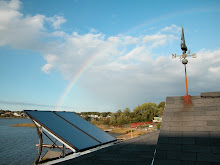Sunday, February 1, 2009
Net Metering
Many people generate their own power for a variety of reasons, living "off the grid," saving money, cutting down on greenhouse emissions, or just sticking it to the power company. For those who have not cut the umbilical cord of their energy provider with a battery storage system, you need to understand net metering. If you use electricity, your electric meter spins and records your usage for billing purposes. If you generate more energy from your photo voltaic panels, wind generator, methane generator, water wheel or any other source that you use, the excess power causes your electric meter to spin in reverse, sending the excess into the transmission lines. The power you supply into the system is like a savings account for electricity. When you use power, it is deducted from your "savings." At the end of the year, you want to have a "net" usage of zero or lower. In other words, you want to have generated at least as much power as you have used. If you have generated more power than you have used, you may be entitled to payment from your energy provider, as they are selling the electricity you supplied to other customers. You need to check your power company's policy on this. Usually you can find it on their website in the "riders" section. Some power companies simply pay you at the end of the year while some won't pay you unless you buy a license from them, which would usually cost more than the power you supply. Some require a separate meter that measures the amount or power you produce. You should also check your state's regulations on net metering. Regardless of whether you get payed for your excess power generation or not, you should strive for a net of zero. You might not be part of the solution, but you will no longer be part of the problem.
Subscribe to:
Post Comments (Atom)

No comments:
Post a Comment